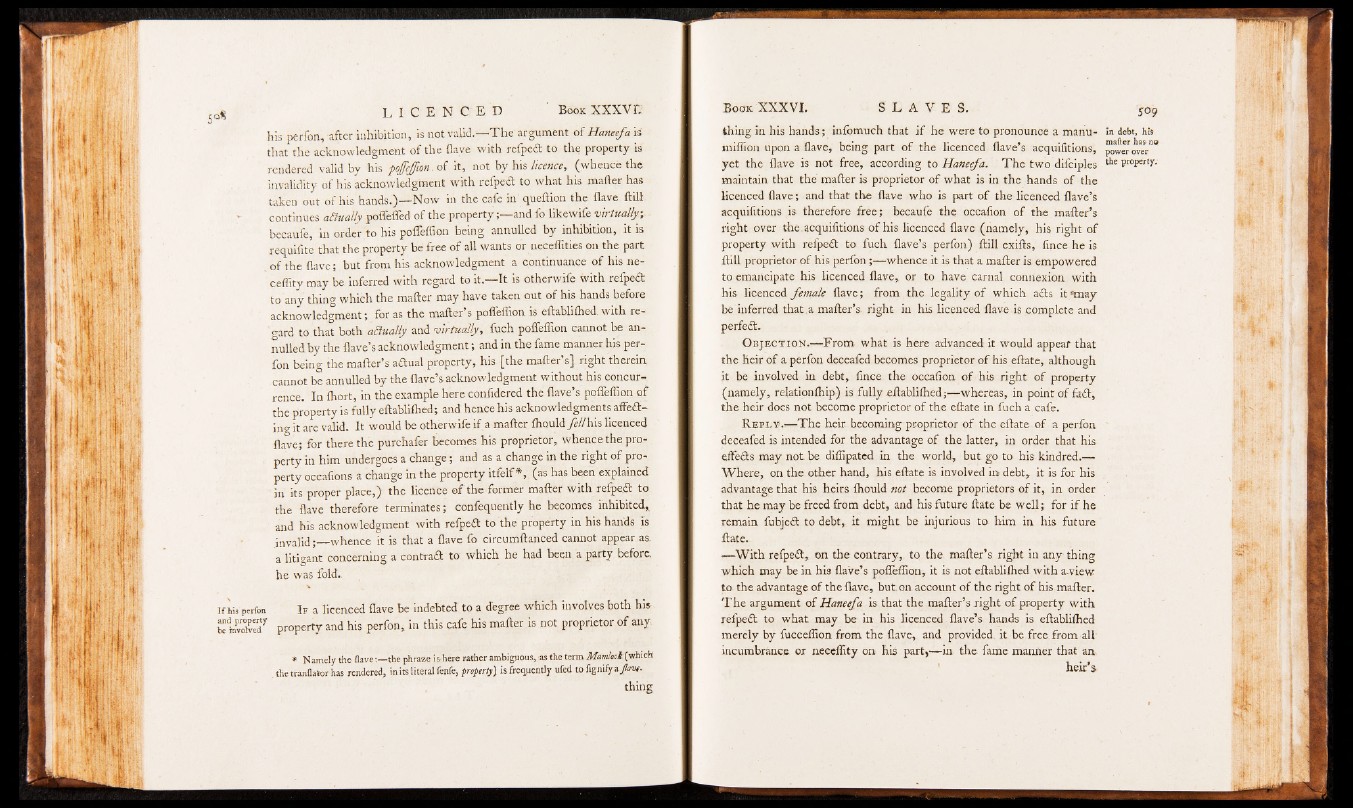
his perfon, after inhibition, is not valid.— T h e argument of Haneefa is
that the acknowledgment of the flave with refpeft to the property is
rendered valid by his poffejfton. of it, not by his licence, (whence the
invalidity of his acknowledgment with rci'pccl to what his mailer has
taken out of his hands.)— Now in the cafe in quelhon the Have Hill
continues aBually poffeffed of the p r o p e r ty a n d fo likewife virtually,
becaufe, in order to his polfelfion being annulled by inhibition, it is
requifite that the property be free of all wants or neceffities on the part
of the flave; but from his acknowledgment a continuance of his ne-
ceflity may be inferred with regard to it.— It is otherwife with relpedt
to any thing which the mailer may have taken out of his hands before
acknowledgment; for as the mailer’ s poffeffionis eftablilhed. with regard
to that both actually and virtually, fuch poffeffion cannot be annulled
by the Have’s acknowledgment; and in the fame manner his perfon
being the mailer’ s adual property, his [the mailer’ s] right therein
cannot be annulled by the flave s-acknowledgment without his concurrence.
In Ihort, in the example here conlidered the Have’s poffeffion of
the-property is fully eftablilhed; and hence his acknowledgments affedl-
inv it are valid. It would be otherwife if a mailer Ihquld/e//his licenced
Have; for there the purchafer becomes his proprietor, whence the property
in him undergoes a change; and as a change in the right of property
occalions a change in the property itfelf * , (as has been explained
in its proper place,) the licence of the former mailer with refpedfc to
the flave therefore terminates; confequently he becomes inhibited,
and his acknowledgment with refpeft to the property in his hands is
invalid;— whence it is that a flave fo circumftanced cannot appear as
a litigant concerning a contract to which he had been a party before,
he was fold..
perfon
property
involved
If a licenced flave be indebted to a degree which involves both his-
property and his perfon, in this cafe his mailer is not proprietor o f any
* N a m e l y t h e f la v e -.— th e p h r a z e is -h e r e r a t h e r am b ig u o u s , a s th e t e rm Mamloot (w h ic h !
t h e t r a n f l a t o r h a s r e n d e r e d , in i t s l i t e r a l f e n fe , property) is f r e q u e n t l y u f e d t o f i g n i f y a / r a r -
thing in his hands; infomuch that i f he were to pronounce a manu-
miffion upon a Have, being part of the licenced Have’ s acquilitions,
yet the Have is not free, according to Haneefa. The two difciples
maintain that the mailer is proprietor of what is in the hands of the
licenced Have; and that the flave who is part of the licenced flave’s
acquilitions is therefore free; becaufe the occalion of the mailer’s
right over the acquilitions o f his licenced flave (namely, his right of
property with refpedl to fuch flave’s perfon) Hill exifts, lince he is
Hill proprietor of his perfon ;— whence it is that a mailer is empowered
to emancipate his licenced Have, or to have carnal connexion with
his licenced female flave; from the legality of which adts it «may
be inferred that a mafter’s- right in his licenced flave is complete and
perfect.
O b j e c t i o n .-— From- what is here advanced it would appear that
the heir of a perfon deceafed becomes proprietor of his eftate, although
it be involved in debt, lince the occalion of his right of property
(namely, relationlhip) is fully eftablilhed;— whereas, in point o f fail,
the heir does not become proprietor o f the eftate in fuch a cafe.
Repltp.— The heir becoming proprietor of the eftate of a perfon
deceafed is intended for the advantage of the latter, in order that his
effects may not be diffipated in the world, but go to his kindred.—
Where, on the other hand, his eftate is involved in debt, it is for his
advantage that his heirs Ihould not become proprietors of it, in order
that he may be freed from debt, and his future Hate be we ll; for i f he
remain fubjedt to debt, it might be injurious to him in his future
ftate.
— With refpedt, on the contrary, to the mafter’s right in any thing
which may be in his flave’ s poffeffion, it is not eftablilhed with a-view:
to the advantage of the flave, but on account of the right o f his mailer.
T h e argument of Haneefa is that the mafter’ s right of property with
refpedl to what may be in his licenced flave’ s hands is eftablilhed
merely by fucceffion from the flave, and provided, it.be free from all
incumbrance or neceffity on his party— in the fame manner that anheir’s
in debt, his
matter has no
power over
the property;